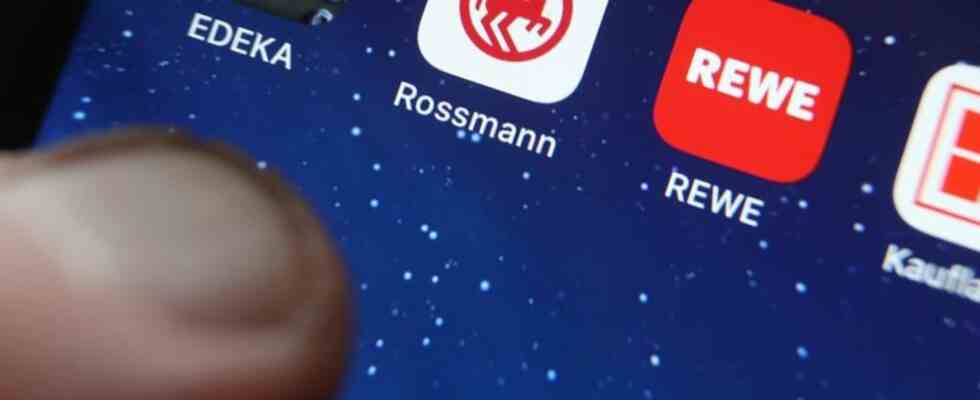privacy
The transparent customer – Saving via app is a trend
Icons of apps from retail chains such as Edeka, Rossmann and REWE on an iPhone display. photo
© Karl-Josef Hildenbrand/dpa
If you want to take advantage of the best offers when shopping in the face of inflation, you need an additional app in more and more stores. Consumer advocates emphasize: These discounts also have their price.
Simply going to the checkout when doing your weekly shopping and paying without showing your smartphone – that could soon almost be a luxury. Because many large supermarkets and drugstores such as Rewe, Edeka, DM or Rossmann are increasingly relying on discounts that can only be obtained with the company’s own apps. In this way, a few euros can be saved each month, which, in view of the enormous price increases in recent months, has met with great interest. The providers also see an opportunity in this – not least because they can access much more customer data.
Consumer advocates are aware of this trend. “Savings apps seem to be booming because currently every euro is turned over twice before it is spent,” says data protection expert Christine Steffen from the North Rhine-Westphalia consumer advice center. There are no indications that large providers such as supermarket chains could use the data obtained in a different way than stated. But: The apps gave the providers an even more precise insight into consumer behavior.
Individually tailored offers
In fact, Kaufland, which has been offering its own benefit program for a year now, speaks of “targeted” coupons for which shopping behavior is evaluated. “For example, young families can receive coupons and discounts that suit their current living situation,” it says. “The number of users is growing steadily,” confirms Lidl, which issues a discount coupon for the user’s birthday with its app, for example.
“The providers want to find out as much as possible about the user. They make no secret of this. In the end, the user pays for the advantages with his data,” says Steffen. Is it still worth using the app? Everyone has to decide for themselves, says the legal expert: “Anyone who wants to save data should not use such an app.” There are also ways to use the apps and keep your data trail relatively small by not granting or restricting permissions like location sharing. It is possible that not all functions of the app would then be available.
The demand is increasing
Rewe has had app coupons for three years. According to the company, the demand has increased recently. One sees a “trend that corresponds to the digital zeitgeist”. And yes, the advertising approach, which also includes the customer loyalty systems, has been “adapted to current circumstances such as rising inflation”. At the moment, however, the coupons are being made available without personalization – unlike, for example, with the Payback bonus system, which can be integrated into the Rewe app, subject to consent.
Edeka also explains that the demand for its app is constantly increasing. The current version has been downloaded around 3.5 million times within two years. The discounts vary depending on the market and customer. As a rule, every user should receive at least five coupons, but usually more than twelve. In addition, the app is used by Edeka retailers to communicate with customers, to optimize the range and to provide targeted offers. The customer data are “intended exclusively for exchange in the market”.
Drugstores are also participating. Rossmann is a kind of pioneer, because the chain based in Lower Saxony has been delivering discounts and coupons that are only available with the app since 2016. There are now millions of users in Germany every month.
The Karlsruhe competitor DM is also expecting more than three million new customer accounts this year alone, as managing director Sebastian Bayer says. He explains that Payback and the app make it possible to “get to know customers even better” and to design a relevant range for them. The claim of DM is a reliable and comprehensible pricing.
No personalized prices proven so far
However: At least theoretically, it is conceivable that providers will not only offer discounts based on the data collected, but also demand higher prices individually. “Each retailer is basically free to determine the price at which it sells a product. It also doesn’t have to offer every customer the same price. That applies equally to the analog and digital world,” explains consumer advocate Steffen.
If the providers make an offer tailored to a user based on customer data alone, they have to inform the addressee that the price has been personalized based on automated decision-making, she says. There have been new transparency requirements for this for a few months. There is no evidence that such personalized prices are used on a large scale in Germany.
Nevertheless, the app coupons alone ensure that the price when shopping is no longer the same for every customer. There are exceptions. Aldi Nord and Aldi Süd explain in unison on request: You do without “complex app discounts or point systems” – and just make the best offers.

